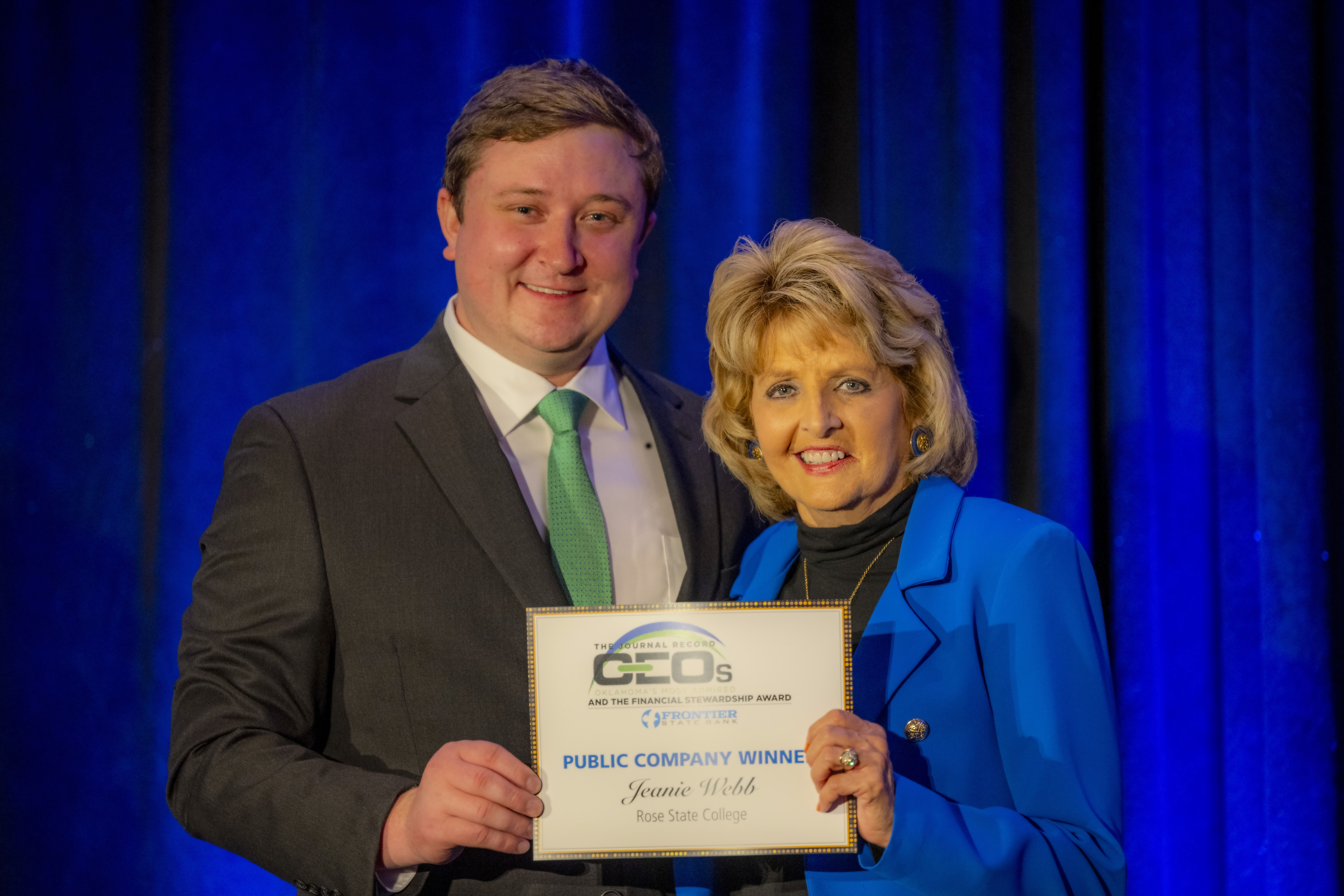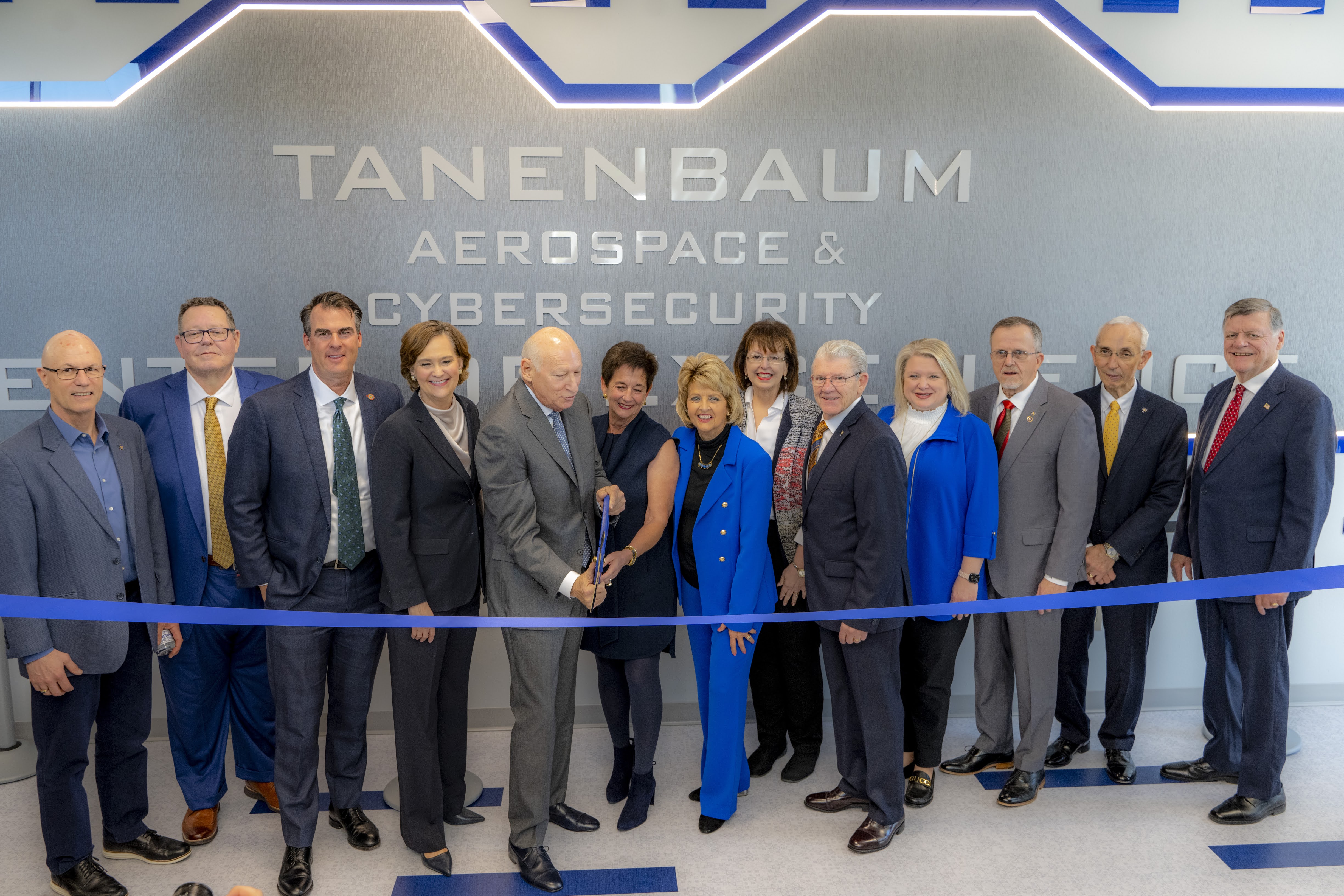Derrik, Pauline
Pauline Derrik
Born: 1924
Date Interviewed: March 1, 2003
Interviewer: Meredith Fazendin
Topic: World War II work experience at Tinker Field/Douglas Aircraft
Q: When and where were you born?
A: I was born in Oklahoma County, Oklahoma, near Bethany, Oklahoma on August 24, 1924.
Q: Did you stay there long?
A: I was little and don’t remember. We lived on a farm. Then we moved to my grandmother, who came from England, and had homesteaded there near Yukon. My dad and mother bought the farm from all the rest of the children and took up farming there when I was old enough to know what was going on.
Q: Did you go to school there?
A: Yes, I went to school at Putnam. From kindergarten to the first grade I stayed with my aunt and went to school at Oklahoma City at Whittier on 10th Street. My mother was quite ill and I was little and in the way, so she shipped me off to my aunt, who didn’t have children, so she was thrilled to death to have me. I went from the 1st grade there, and the 2nd and the[to] 5th we went to Edmond, and my dad ran the only feed store there in Edmond. Then the 6th and [to] 12th grade I went to Putnam City. We moved back out to the homestead and he farmed. Then I went to Blackwood and Davis Business College and finished that.
Q: What were your interests and hobbies as a young woman?
A: Swimming, sewing, skating, church activity, and basketball five years.
Q: When did you begin to get a sense that the US was headed toward war? Or how old were you?
A: At the age of 17 you don’t really pay much attention to world affairs, and we didn’t have all this media – TV and things. We had the radio and our newspaper on the farm came a day late so we didn’t have much news, only from the radio and newspaper.
Q: What did you think about it?
A: I was out with my boyfriend then and we were out at the park riding horses. When I came home my dad said we had been bombed – Pearl Harbor was bombed – and we were in war. Well, I didn’t hardly realize what war was and it just scared me to death. That was my last year of high school, and of course all the boys wanted to enlist and go get it over with. It made everyone mad and they were wanting to fight. Most of the boys didn’t finish high school. They enlisted and left.
Q: Was your boyfriend one of those?
A: Yes, he went into the SeaBees.
Q: What did you think about that?
A: It was just all different and you couldn’t imagine what was going on. It was scary.
Q: What was the atmosphere like and the mood of people in the town in which you lived?
A: They were upset and wondering how things would be. . .
Q: What did him enlisting do to your relationship? Did you keep in touch with him?
A: We just wrote back and forth. There was no e-mail then to write back to you, you know! We had “V” mail – little letters we wrote so they could handle the bulk of mail then. You couldn’t write very much on them. Sometimes they’d have two and three, well he wouldn’t know what I was talking about one day and the next day or maybe a week or ten days later the second page would come in. It went faster, so you wrote those instead of writing regular mail.
Q: How did that work?
A: Well, they read all of them. If you said anything about or any atmospheric things it was blacked out of your letter where they couldn’t read it so not to give the enemy any [information].
Q: When did the government announce that the women were going to be brought into the defense industry?
A: While he was gone, I met up with another fellow and started dating for about a year and when he was drafted to go overseas, he wanted to be sure I’d be here, so we married, which was a big mistake! I didn’t want to, but I was talked into it. At 18 years old, you’re upset because he’s leaving and it upset my high school friend that I had been going with. It was all that mixed up life thing – you didn’t know what tomorrow would be and . . .
Q: So he left and you were married to him?
A: Yes. He was in the service when we met.
Q: So then what happened?
A: Well, I followed him. We went to Albuquerque. He was standing in line for a movie and talking about finding a house to live in so he could bring me over there, and a man overheard him and said he had a house in town that we could use. So I came and we went out there and it was a beautiful ranch-style home and he had just turned the key over to him! I thought “Are you sure this is alright?” It was a beautiful home – just gorgeous. We stayed there for about two months, then moved into a little apartment like a little motel, which was quite inconvenient after having that huge house. There was a gardener who took care of it, and I was so lonely I went out and talked to that gardener! We had about a mile and a half to walk to get on a bus and I had to carry the groceries and everything else. So my friend and I were lonely and we thought we’d go get us a job. We went down to Montgomery Ward and they hired us the next day! I was put in the credit department and she was put in the place where the packages all come in. But I couldn’t understand these Mexicans and I couldn’t fill out all the papers. So we quit the next day! It was just better to be lonesome and sit around than to put up with that mess going back and forth.
Then we moved to San Antonio, and he shipped out. I came back. In the meantime I had worked at the telephone company after I got out of business school. . .
Q: When did you decide to become a so-called “Rosie the Riveter,” or work in the war effort?
A: When I came back I thought instead of going back to telephone company – they only paid $65.00 a month for an 18 year old kid, although that was big money then – I remember walking by a store window thinking “I can buy anything in there, dresses and things! So I thought this defense work may pay more, but I don’t remember what they paid us. I went and applied, took the test, passed it. I guess I went to work right after that.
Q: How did the people close to you react to your decision?
A: Everybody else was in jobs and we felt anything we could do would help get this war over with. I was put in the modification department upstairs in the office. I wasn’t a riveter – I would have had everything riveted to the wall – I’m not mechanical! I’m more the office type!
Q: Did you know any other women in your area that were also going to become involved? Did your friends do that as well?
A: No, not that I knew.
Q: What kind of job or jobs did you work? What were you responsible for?
A: This was just a job in the office. I was in the planning department. After the main airplane, the C-47, came down the line from the main plant, they brought it over to our modification hangers and we put the radar. My job was to assemble the parts, put it on shop orders so the people downstairs could take the shop orders and make the parts as we told them to.
Q: How many hours per day did you work and how many days per week did you work?
A: Sometimes it was 8, sometimes 10, just depended. Every day. I worked on the daytime shift. They had a swing shift and a graveyard shift. Sometimes I worked Saturday and sometimes I worked Sunday, just depended on how the work was.
Q: Was the pay better than the phone company after all?
A: I don’t really remember that. A friend who I did not know was working out there, when they started shutting down, they plopped me right down beside her. We didn’t know each other was even out there. So that was the only one that I really knew.
Q: How long did your employment last?
A: I worked and closed the plant in 1945.
Q: So when did you start there?
A: I started I think in 1943.
Q: Did you like it out there?
A: Well, it was sure different! Then later on my sister, whose husband was at Tinker, I lived with them and you had one bus that you could catch to get to this modification [plant], and if you missed it there was no way you could get from the main Douglas over to the modification. So it was kind of a problem. Cold! If you have ever been out in a hanger, it is cold! You had to walk, probably about a half a mile from where you had parked there was so many people employed. That was kind of a cold place to be out in those hangers. It was very noisy, also – very unusual!
Q: What was the mood of your fellow female workers?
A: There was a lot of men – mostly men were the supervisors of the department – and the women had people over there fighting [in the war] and there was sort of hard feelings for these fellows that came out there to keep from going overseas. You thought “yea, you 4Fs – draft dodgers.” We had feelings against that type of man. Some of them may have had problems, but still kind of wondered about them, and you couldn’t go around and ask them why they weren’t fighting. And there was a lot of fraternizing among the men and women. Some of the women were married and it caused a lot of divorces. A lot of “dear John” letters, because whenever you put men and women together like that it’s bound to happen, especially if a lot of rumors came from the swing shift and night shift who weren’t supervised as closely as we were.
Q: Did the women enjoy the work, or did the work prove difficult for some of the women?
A: I don’t know, being in the office. But they did send me to school reading blueprints. It was at night. I went downtown to Classen High School – that was a main high school in Oklahoma City. We rode the bus from Midwest City every night. My sister went with me and she took it too. I really learned a lot and it gave me a lot of promotion in my job there in the planning department.
Q: Were there a lot of different races of women there?
A: I didn’t notice so much of the black people at the time at all. In fact, I don’t think there was anything but white people.
Q: Do you think all the women were treated equally, or as equal as the men?
A: Well, they were around where I was, yes. They had respect for us. We all did our job – it was just an office.
Q: What did the men think about all these women working at Tinker?
A: I don’t know what they thought down on the line. They weren’t taking anybody’s job at the time because anybody that was draftable was gone, so there was just the people left that were either 4F or escaped the draft – married or over the drafting age. There were a lot of farmers came in. Most of the people that I knew were from out of town and had apartments or rented a house or something. Maybe there was three or four women renting an apartment and living together then. They would go back out home on the weekends, so we didn’t really make lifetime friendships then. We just all had fun with each other while we were there.
Q: Did you have any really good memories of being there?
A: Well, we had one girl that was particularly interesting. She was very busy. She would write stories and I imagine she is a writer by now. But she used to keep us hilarious with her writing. She’d act like she was working and she would be writing a story and then, in the meantime, we would read it. She really had talent! I would love to know what ever happened to her. I don’t even remember her name.
We liked to visit, but you didn’t have much time to visit. So we’d all go to the restroom together so we could talk. Well, our supervisor did not like that and he went back there and said “I wish you girls would go one at a time.” Well, that spoiled our fraternizing down in the restroom! We started going one at a time.
We had 30 minutes for lunch, which wasn’t a very long time. You walked down to the cafeteria and there was no machines then to get sandwiches. You just took your lunch and that was it.
Q: After the war, was there any kind of pressure from the government for the women to leave Tinker?
A: I think they were all glad to get out of there. I stayed after they started slowing down and the modification work was out. I had to go over and help with closing the plant down. All the people downstairs. All the machines had shut down. It was dark down there – just like a grave – after you walked through where all these people were laughing and happy and busy and little carts running around everywhere, but now everything was just quiet as a morgue. It was quite a difference. And of course we were assembling parts to get them stocked. I did that until my husband came home the end of 1945.
Q: How do you think the war years impacted the lives of women in this country?
A: It makes us real anxious right now with what’s going on. We’ve been through about five wars, and I think now it creates a terrible feeling for us – are we going into this again? [speaking of the possibility of war in Iraq]. Are we needed over there to help run everybody’s business? This last time we were attacked, but from then on, we’ve always gone to help other countries. I don’t know whether we help or hinder or what. It seems like every country hates us or is jealous of us.
Q: Did the skills you learned during the war serve you in any kind of way in the subsequent years after the war? Did you get another job?
A: No, I quit, went home, and we bought a home, and we started a family. We have two daughters. Then I had the terrible things of losing my children’s father in an accident after being over there [in the war] for four years. Then for eleven years I worked for Aerocommand out in Bethany. That’s where I raised my two girls by myself. The things that I learned [at Tinker] like blueprint reading gave me a super job. I was their waste engineer up in the engineering department, so I had a real good salary. That helped me, so I would say the war effort and working out there gave me an education to work around defense.
Q: When did you meet your current husband?
A: We’ve been married about 29 years. They had church events and both of us have always been interested in church. They had singles events like bowling. They had discussion groups and swimming parties and potluck dinners – anything you wanted to do. That’s where I met him – bowling!
Q: So how old were you when you were working at Tinker?
A: Well, I was 18, 19, 20, 21. I had my first baby at 21 after he came back. He would have been over there four years that Christmas if he hadn’t come home. There was no leave – the only way he could come home was if he was wounded – so he was gone nearly four years.



